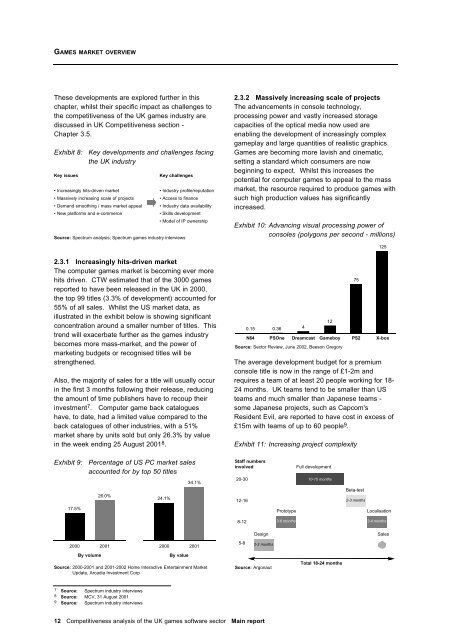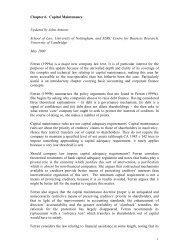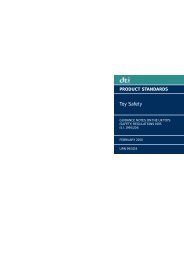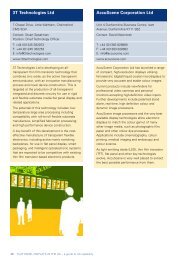From Exuberant Youth to Sustainable Maturity - DTI Home
From Exuberant Youth to Sustainable Maturity - DTI Home
From Exuberant Youth to Sustainable Maturity - DTI Home
Create successful ePaper yourself
Turn your PDF publications into a flip-book with our unique Google optimized e-Paper software.
GAMES MARKET OVERVIEW<br />
These developments are explored further in this<br />
chapter, whilst their specific impact as challenges <strong>to</strong><br />
the competitiveness of the UK games industry are<br />
discussed in UK Competitiveness section -<br />
Chapter 3.5.<br />
Exhibit 8: Key developments and challenges facing<br />
the UK industry<br />
Key issues<br />
• Increasingly hits-driven market<br />
• Massively increasing scale of projects<br />
• Demand smoothing / mass market appeal<br />
• New platforms and e-commerce<br />
Source: Spectrum analysis; Spectrum games industry interviews<br />
2.3.1 Increasingly hits-driven market<br />
The computer games market is becoming ever more<br />
hits driven. CTW estimated that of the 3000 games<br />
reported <strong>to</strong> have been released in the UK in 2000,<br />
the <strong>to</strong>p 99 titles (3.3% of development) accounted for<br />
55% of all sales. Whilst the US market data, as<br />
illustrated in the exhibit below is showing significant<br />
concentration around a smaller number of titles. This<br />
trend will exacerbate further as the games industry<br />
becomes more mass-market, and the power of<br />
marketing budgets or recognised titles will be<br />
strengthened.<br />
Also, the majority of sales for a title will usually occur<br />
in the first 3 months following their release, reducing<br />
the amount of time publishers have <strong>to</strong> recoup their<br />
investment 7 . Computer game back catalogues<br />
have, <strong>to</strong> date, had a limited value compared <strong>to</strong> the<br />
back catalogues of other industries, with a 51%<br />
market share by units sold but only 26.3% by value<br />
in the week ending 25 August 2001 8 .<br />
Exhibit 9: Percentage of US PC market sales<br />
accounted for by <strong>to</strong>p 50 titles<br />
17.5%<br />
2000<br />
26.0%<br />
24.1%<br />
34.1%<br />
2001 2000 2001<br />
By volume By value<br />
Source: 2000-2001 and 2001-2002 <strong>Home</strong> Interactive Entertainment Market<br />
Update, Arcadia Investment Corp<br />
7 Source: Spectrum industry interviews<br />
8 Source: MCV, 31 August 2001<br />
9 Source: Spectrum industry interviews<br />
Key challenges<br />
• Industry profile/reputation<br />
• Access <strong>to</strong> finance<br />
• Industry data availability<br />
• Skills development<br />
• Model of IP ownership<br />
12 Competitiveness analysis of the UK games software sec<strong>to</strong>r Main report<br />
2.3.2 Massively increasing scale of projects<br />
The advancements in console technology,<br />
processing power and vastly increased s<strong>to</strong>rage<br />
capacities of the optical media now used are<br />
enabling the development of increasingly complex<br />
gameplay and large quantities of realistic graphics.<br />
Games are becoming more lavish and cinematic,<br />
setting a standard which consumers are now<br />
beginning <strong>to</strong> expect. Whilst this increases the<br />
potential for computer games <strong>to</strong> appeal <strong>to</strong> the mass<br />
market, the resource required <strong>to</strong> produce games with<br />
such high production values has significantly<br />
increased.<br />
Exhibit 10: Advancing visual processing power of<br />
consoles (polygons per second - millions)<br />
The average development budget for a premium<br />
console title is now in the range of £1-2m and<br />
requires a team of at least 20 people working for 18-<br />
24 months. UK teams tend <strong>to</strong> be smaller than US<br />
teams and much smaller than Japanese teams -<br />
some Japanese projects, such as Capcom's<br />
Resident Evil, are reported <strong>to</strong> have cost in excess of<br />
£15m with teams of up <strong>to</strong> 60 people 9 .<br />
Exhibit 11: Increasing project complexity<br />
20-30<br />
12-16<br />
8-12<br />
5-8<br />
0.15 0.36 4<br />
N64<br />
Staff numbers<br />
involved Full development<br />
Source: Argonaut<br />
Pro<strong>to</strong>type<br />
3-6 months<br />
10-15 months<br />
Total 18-24 months<br />
Beta-test<br />
2-3 monthss<br />
Localisation<br />
3-4 months<br />
Design Sales<br />
2-3 months<br />
PSOne<br />
Source: Sec<strong>to</strong>r Review, June 2002, Beeson Gregory<br />
12<br />
75<br />
125<br />
Dreamcast Gameboy PS2 X-box
















